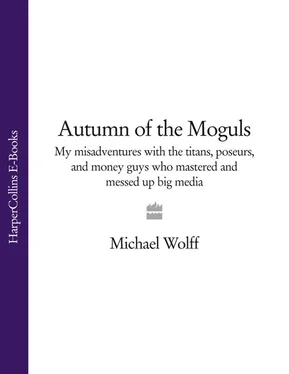That must have quieted the crowd: You can hear the rustle of embarrassment.
The creation of media power is, in Halberstam’s telling, the creation of civic power. The Paleys and Meyers and Luces aren’t press barons (marginal, corrupt, eccentric figures). These are true American enterprise figures, as large in his telling as the Rockefellers and Henry Ford and the Kennedys. (Indeed, the Kennedys would not have been the Kennedys without the aid of many of the people in Halberstam’s book.)
Before the advent of these people and their organizations, the media was vaudevillian. Here, midcentury, the media, with its ever-expanding reach, becomes both a vastly powerful voice and amazingly lucrative business.
This is, however, the news media .
There is no entertainment in Halberstam’s media view. Movies, rock and roll, prime-time, celebrities, as late as 1979, when Halberstam’s book is published, have no place in a serious discussion of the media landscape. Even Paley’s great sitcom-and-variety-show empire is overshadowed by the position and power he acquires through his news division. The focus in the book is the American commonweal, rather than the media commonweal, political culture rather than pop culture.
Serious men engaged in serious matters.
It would never have occurred to Halberstam or anyone else he profiles and mythologizes in his book that the media industry would, over the next generation, become the nation’s largest industry because, in part, it would provide escape from this boring civic world. ( People magazine, launched in 1974 by Henry Luce’s company—after Luce died—and which becomes the most successful magazine of all time, surely helps invent the new, alternative, celebritified, noncivic power structure.)
And yet while Halberstam misses the soon to be inescapable and elemental point about the media business, he nails another fundamental point: The media has suddenly become a really great business. He gets the hunger for media. People are eating this stuff up. It’s totally hot.
You can’t read The Powers That Be and not start to think, That’s where it’s happening.
It’s like the West: free land.
The romance of Halberstam’s world is not only in its cleverness and toughness and even nobility, but also that it’s so easy. Anybody could do this. Anybody could be this kind of success.
It’s the first structural analysis—who knew this person and who knew that person and how the web of connections and being in the right place at the right time intersected with the nation’s changing education levels, its advancing aspirations and the laws of supply and demand—of a media career. And it’s the first time that the media business is considered as not just the story of newspapers or magazines or television, but in the aggregate, cross-platform sense which makes it all so much, well, bigger.
Everybody I know of a certain generation in the media business read The Powers That Be and took it ever so seriously. Many of us, I’ll wager, came into the media business, rather than, say, government or academia, because of The Powers That Be .
Конец ознакомительного фрагмента.
Текст предоставлен ООО «ЛитРес».
Прочитайте эту книгу целиком, купив полную легальную версию на ЛитРес.
Безопасно оплатить книгу можно банковской картой Visa, MasterCard, Maestro, со счета мобильного телефона, с платежного терминала, в салоне МТС или Связной, через PayPal, WebMoney, Яндекс.Деньги, QIWI Кошелек, бонусными картами или другим удобным Вам способом.












